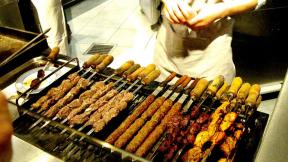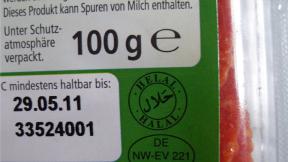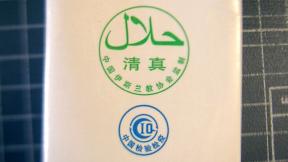
Before you feast on that carefully selected Halal burger from your local Muslim grocer, consider this disturbing statistic: 75 percent of Halal meat in America produced in the year 2000 came from pork fed cows, according to Dr. Stephen Emanuel, from Agway Feed Company.
The story gets even worse in light of the recent discovery of mad cow disease. The first case ever in America was discovered in Washington state in December 2003. Mad cow disease in animals is caused by animal cannibalism- the practice of feeding animals used for human consumption with other animals. This practice is a meat industry standard.
The truth is that beef, as well as all other animal products, including chicken, dairy, and eggs, are not safe, even without the risk of mad cow disease. Most are jam-packed with fat and cholesterol and increase the risk of heart disease, cancer, and diabetes. (Yes, chicken has nearly as much cholesterol as beef.) Loaded with too much protein, they raise the risk of kidney disease and osteoporosis. And given intensive farming and slaughtering processes, they're often contaminated with foodborne pathogens.
In the United States the cows are being fed pork based protein, like pork meat byproducts, pork bone meal, explains Mazhar Hussaini, president of the North American Halal Foundation. It is also the same with chicken.
Muslims are directed in the Quran to eat food that is Halal and Tayyib. Halal is defined as food that is permissible according to Islamic law. Tayyib means wholesome, pure, nutritious and safe. Traditionally, Muslims in North America have emphasized the Halal over the Tayyib when it comes to meat consumption, Hussaini says.
For instance, great emphasis is placed on ensuring that animals slaughtered for consumption are done so in the Islamic manner (the practice known as Zabiha). However, little to no attention is given to whether or not the animal itself is healthy, free of disease, hormones, antibiotics, and chemicals at the time of slaughter. Also, what kind of food it consumes is not taken into consideration, despite the fact that herbivorous animals only are permissible to eat.
Moreover, price is a major consideration for Muslims, at the expense of meat quality.
My experience is that Muslims are willing to pay for Nike shoes for $150 but when it comes to meat to feed their family, they will bargain on pennies, says Adnan Aldayel, president of Dakota Halal Inc. The company produces Halal meat products which are raised on vegetarian diet distributed primarily on the East and West Coast.
Organic meat is one option for Muslims insistent on feeding their families Halal and Tayyib food.
Organic meat is produced with animals raised on land free of pesticides, fertilizers, genetically engineered or irradiated foods. Farmers keep a detailed record of all methods and materials used in growing or producing the meat. With cows, all feed and pasture on which they are grazed must be organic. They are also not allowed hormones or antibiotics. However, they can be vaccinated. Animals are considered organic after three months of being raised on an organic farm.
Thirty-nine percent of the US population uses organic products. Sales of organic food totaled $5.4 billion in 1998, about $6.5 billion in 1999, and reached nearly $7.8 billion in 2000. The market has grown 20%-24% annually during the 1990s
Although organic foods account for less than one percent of total retail food sales, this sector is growing faster than any other area of the food industry. Since 1992, sales of organic foods have increased by more than 20 percent annually with continued strong growth expected for at least the next decade.
But according to Hussaini, organic is not the only choice Muslims have if they want to maintain a diet free of Haram and hormones. Meat produced on natural farms is another option.
Natural beef is produced from animals not fed any meat-based proteins, hormones or preservatives. Animals are fed grass, hay, corn, beans and oats. Natural farmers do however use antibiotics and different kinds of medicine if an animal is sick. However, they will wait 30 days after administering antibiotics or medicine to slaughter the animal. This is done to make sure the effects of the antibiotics are no longer in the animal's system. An animal is considered natural after living three months on a natural farm.
At the moment there are few Halal meat producers who choose animals for their products that are strictly fed non-animal feed. Aldayel's Dakota Halal, CrescentHalal.com (hand slaughter) and the Ohio-based Halal Pride Chicken (machine slaughter) are three that have taken steps towards the Tayyib, not just Halal.
An additional problem, according to Aldayel, is that most owners of Halal meat shops across the United States do not really care if the meat they are providing customers meets the best standards of Halal and Tayyib. In some cases, he says, grocers have bought non-Zabiha meat and sold it to unsuspecting customers as Halal.
"UCSC farm rows" by david silver - originally posted to Flickr as UCSC farm rows. Licensed under Creative Commons Attribution-Share Alike 2.0 via Wikimedia Commons - http://commons.wikimedia.org/wiki/File:UCSC_farm_rows.jpg#mediaviewer/File:UCSC_farm_rows.jpg








Comments
assalam aleikum: very good article. since I read it I have been looking for more articles and try to find halal/organic meat providers . if anyone knows how to get to these providers please let me know on this web site. We live in Michigan and there are a lot of halal meat markets but most are not organic.
Location
As-Salaam-Alaikum,The article was enlighting....We all should be living and eating halal/organic food, and lifestyle(that which is good an wholesome) We should be able to go to our Halal Markets and purchase Zabiha meat and eggs,milk,etc. This is why we pay more because its Zabiha/Halal. Our markets should make sure its purchasing Zabiha/Halal products nothing less then that....Insha-Allah we as Muslim should come together and establish and support our own farms and processing plants,this way we will know for sure. May Allah bless our intention.
Location
So many Muslims obsess over the infintesimal moments of killing and ignore the long, miserable, and polluted rest of the lifespan of the animal.
Location
Article is good. However, I have a question now. If I was choosing local halal grocer, I was doing the right thing in my mind. Now if organic halal is not available in my area, am I better off going for organic considering that is better than eating pork fed halal meat?
Location
Although this article is eye opening, I wish that you had provided the contact information for the two organic processing companies. I have been searching for a couple of days and am still not able to find contact info. on either Halal pride chicken or Dakota halal. Are they still in business?
Location
As salam alikum & Jazakallah .It would br of great help to Muslim consumers & sellers too ,if the retailers & whole sellers of Zabiha Halal & Tayib meat /meat produts provide their addresses to sites like sound vision.It would be a good source for their advertizement too.
Location
Very informative. Seems like Halal is not as good as we thought.
Location
its a touch situation. There is a halal meat store in berkeley CA who has told me that the meat they use comes from local farms that do not use hormones or antibiotics. I came to Islam from a perspective of supporting organic farmers and eating organic food, so I don't think it makes a lot of sense to view halal food as the ideal if it comes from animals that are raised cruelly and or fed unhealthy food. Insha'Allah, Allah will be merciful with us in our food choices. I am really happy to learn that there are some halal meat companies that are making an effort to use organic farming techniques, and I believe that it is important to eat both halal and organic/naturally raised meat. As I said before, it is a tricky situation, and, in my opinion, a problem, because its hard to find both of these components in the meat we eat. salams to all of us with our meat choicesAbdul Rahman
Location
Timely article
Location
Pages
Add new comment